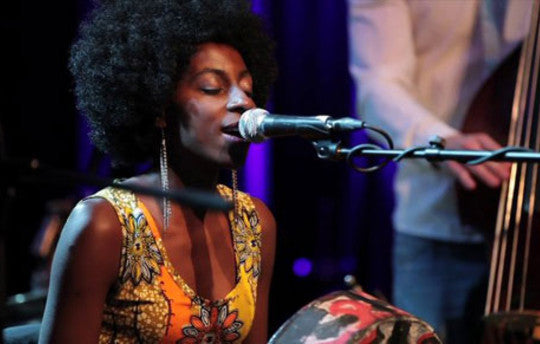Your Cart is Empty

Zimbabweans play the good-time music of suffering. A plummeting economy has brought Harare’s nightlife to its knees, and many musicians have succumbed to AIDS, but for those who remain, music is more important than ever. Despite everything, the hotels, nightclubs and beer halls continue to thump and groove, and punters still throng the dance floors, shaking their bodies and easing their troubles.
Three decades after winning its independence, Zimbabwe is in deep trouble. The once cherished revolutionary government is now widely regarded as corrupt and mismanaged. Worryingly, the instability threatens to reignite dormant hostilities between Zimbabwe’s dominant Shona population and the large Ndebele population in the south.
In recent years, the music industry has been in a constant state of crisis. Public belt-tightening has steadily reduced the crowds in Harare’s famous nightclubs, while many of the best have closed altogether. Worse still, Zimbabwe’s pop music pantheon continues to be devastated by an alarming series of untimely deaths, many of them attributable to AIDS.
Foreign observers often call the mbira a “thumb piano”, though most players reject the term as denying the essential African quality of the instrument. At a bira ceremony, three or more mbiras play songs from an ancient repertoire, going back a thousand years or more. The list of great mbira players in Zimbabwe is long, and some of the best ones may be known only to those in their surrounding villages. A few veteran players like Stella Chiweshe, have gained international reputations.
 Monoswezi’s music sounds fresh and wide-open: traits that owe to the bands marvelously multi-cultural inspirations. Expect gentle mbira, looping percussion, memorable sung melodies, and subtle saxophone.
Monoswezi’s music sounds fresh and wide-open: traits that owe to the bands marvelously multi-cultural inspirations. Expect gentle mbira, looping percussion, memorable sung melodies, and subtle saxophone.
Within the past few years, the mbira scene has been dominated by Mbira dze Nharira: a defiantly traditional six-piece group.
Thomas Mapfumo – known to Zimbabweans as Mukanya – has been the country’s most famous musician for the past quarter-century. The proverbial Lion of Zimbabwe fathered electric mbira music and developed the chimurenga music style, named after the struggle that brought the country its independence in 1980.
For most of the past quarter-century, Oliver “Tuku” Mtukudzi was the second giant of Zimbabwean music, although today, his record and concert sales exceed those of Mapfumo, both at home and abroad. Also forged during the liberation war years, Tuku’s art has generally danced at the fringes of the country’s turbulent politics, sometimes arousing controversy, but never crossing the line into brazen condemnation of the government. This survivor’s strategy, combined with a rich, soul-tinged voice, splendidly matured songcraft and perhaps the best management of any band in Zimbabwe, has brought Tuku to the top.
The term jit originally applied to a kind of recreational drumming and singing performed in Shona villages, but it has become a catch-all term for Zimbabwe’s guitar-driven electric pop, which incorporates elements of Central and East African rumba, South African jive and local traditional music. Formed in 1968, the original hybrids were, Zexie Manatsa and The Green Arrows. Overseas, the best known jit band of the 1980s was The Bhundu Boys, whose flowing and energetic dance music earned them a name in the UK.
In Zimbabwe, song lyrics and dance idioms are the keys to popularity, and many of the biggest sellers these days are local rumba artists, such as Leonard Zhakata. While the dominant influence in Zimbabwean rumba is from Congo, it has a fast triplet feel that is unique, and comes from mbira music.
With the new millennium, the good-time beat has become more important than ever. The rise of sungura – a development of rumba, influenced by mbaqanga and East African kanindo – has been embodied in the success of Alick Macheso, the “King of Sungura”.
Gospel may be the fastest-growing sector of the local music market these days. Attractive and accessible, Charles Charamba and his wife and former backing singer, Mai Charamba are the uncontested leaders of a form that makes up around fiftypercent of the music played on state radio.
Compared with Harare, Bulawayo – in the southwest province of Matabeleland, on the South African border, where the majority speak the Zulu-related language Ndebele – is a sleepy one-horse town, with rather low-key music venues. The torchbearer of Ndebele pop through the 1980s was Lovemore Majaivana, a flamboyant if uneven, performer with a rich powerful voice. Black Umfolosi are an acapella group of singers and dancers from Bulawayo – an amazing live experience with their precise and acrobatic singing and dancing to a strong Zulu beat.
New bands make their mark with difficulty in Zimbabwe. To find a venue, a new band usually needs to work its way, playing in the outlying “growth points” – a tough graft. Local ragga is particularly popular in Harare and the surrounding townships, and the likes of Decibel and Kooligan are regular features of the live music scene, while the immense success of M’Afriq in 2004 demonstrates that there is ample scope for a more Zimbabwean take on the “urban” sound.
Over the past five years, there has been something of a resurgence of jazz in Harare, and groups such as Dudu Manhenga and Color Blu are among the best around.
You can now study these genres through our partner site World Music Method. Click HERE to view the list of courses.